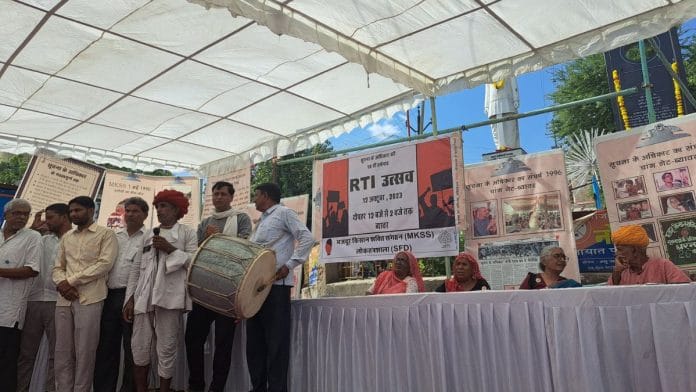New Delhi: The foundation stone for a first-of-a-kind People’s Right to Information (RTI) Museum is being laid in Beawar, Rajasthan. The event is scheduled to take place Sunday as part of the two-day ‘Jashn-e-Samvidhan: Democracy and Right to Information Festival’.
“The establishment of the Right to Information (RTI) Museum in Beawar marks a significant milestone in promoting transparency, accountability, and the people’s right to know. Beawar, as the birthplace of the RTI movement, stands as a symbol of the importance of access to information for survival—whether it’s to receive medicine, pensions, or essential services,” Mazdoor Kisan Shakti Sangathan (MKSS) and School for Democracy (SFD) said in a joint statement.
According to the MKSS website, it is a “people’s organisation and part of the growing Non-party political process in India”. SFD describes itself as “dedicated to promoting and deepening understanding” of democracy, as a concept and practice.
The RTI museum, the statement said, will house a diverse collection of materials, including audio, visual, and print resources related to the RTI movement and act as an archive, compiling documents, materials, and film footage from the MKSS and other contributors. It will be designed to serve as a resource centre for activists, researchers, students, and the general public, facilitating learning and reference on rights-based movements.
It will also aim to engage citizens through workshops, training and courses.
Beawar is referred to by some as RTI ki Janmabhoomi because it pioneered the RTI movement by demonstrating a massive protest in April 1996, which questioned the state government on its delay in granting the right to information. Hundreds of villagers had reportedly gathered to protest against corruption and seek the right to information law that they had been promised a year ago by the then chief minister Bhairon Singh Shekhawat.
The fight began in 1994-1995, with public hearings conducted across Rajasthan against corruption by panchayat and block-level officials. It built pressure on Shekhawat. However, when villagers and activists saw that nothing had been done even after a year of protests, they gathered at the traffic roundabout in the city on 5 April, 1996, to showcase their demands. This eventually became a nationwide campaign.
India then passed the Right to Information Act in 2005, allowing citizens to get information and access to government files that were previously locked.
In 2015, activists again gathered in Beawar to commemorate the sit-in protest that lasted 44 days at Chang Gate roundabout, about two decades ago. An exhibition was held and the slogans used during the protest were put up.
(Edited by Radifah Kabir)
Also Read: ‘Doesn’t dilute RTI Act’ — Vaishnaw says criticism of new personal data protection law ‘unfair’






